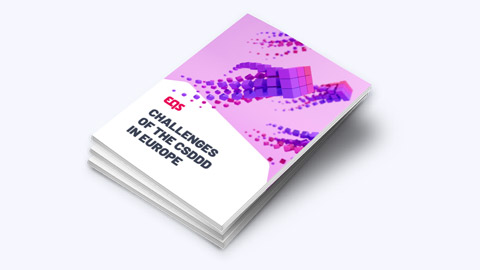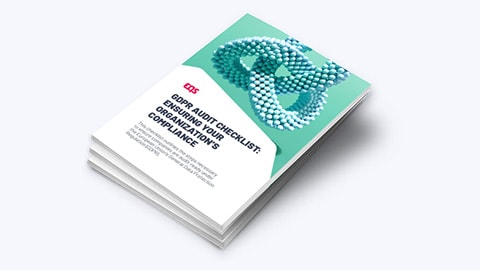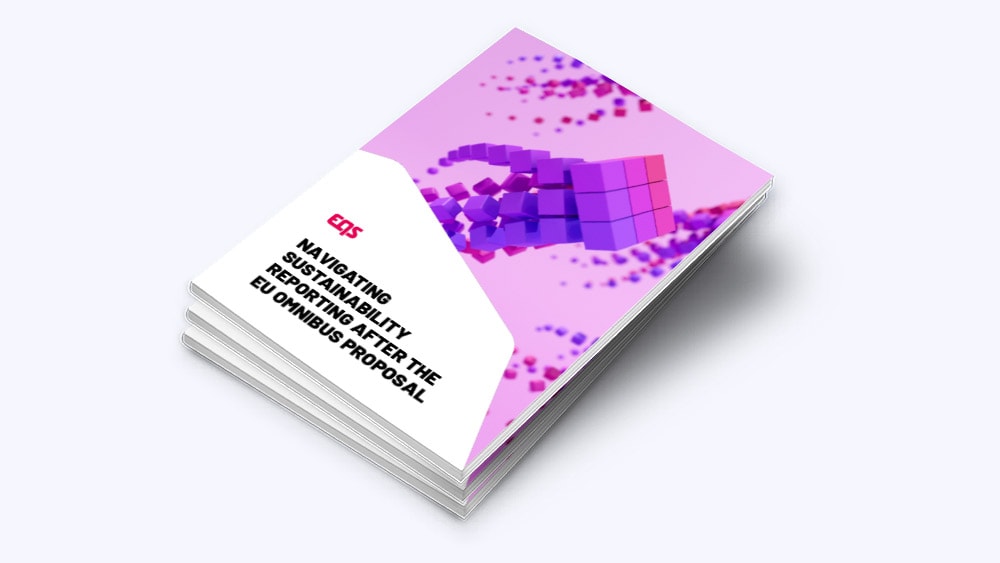“The idea for EQS Group was born in the London fog”
From start-up to international RegTech provider in 20 years: a journey through time with Achim Weick, Founder and CEO of EQS Group AG

EQS Group founder and CEO Achim Weick recounts the story of how the company came to be. From an initial idea born in the London fog, ambitious objectives saw the RegTech provider grow into a truly international organisation with offices in nine countries. 20 years after being founded as Equitystory.com, EQS Group has come a very long way but it still maintains its founding values of team spirit and passion to drive success.
Achim, if you go back 20 years. Would you have thought at that time that EQS Group, founded as Equitystory.com and intermediately operating as EquityStory AG, would one day resemble the company we see today?
We set ambitious objectives from the very beginning. An office in New York was written into our business plan, for example – so it’s even more satisfying to see that two decades later we have achieved many of these plans and fulfilled expectations. My sincere thanks for this goes to our 380 employees at our nine EQS locations worldwide because without their dedication, this tremendous growth would not have been possible. However, when I started the company, we were not necessarily planning to become a cloud service provider for corporate compliance and investor relations. In those days, our only focus was developing our platform Equitystory.com.
Equitystory.com was ground-breaking. How did you come up with the idea to launch the first B2B platform for investor relations?
There is a back story to this. I was working in investment banking for a major German bank in 1999 when there were a lot of IPOs in Germany. On the way to a roadshow in London, our plane was delayed due to dense fog, then the taxi struggled through the crowded streets of the capital as the event was about to start. The stressful experience of travelling, combined with the uncertainty as to whether the event would actually deliver what it promised, made me realise just how inefficient the whole process was. There should be an easier way for companies to communicate with investors.
And the efficient solution was …
… a platform for the capital market which enabled institutional investors, based on their user profiles, to access information on publicly traded corporations and quickly make contact with them. Company profiles were created in the form of on-demand videos to meet the needs of financial professionals. The idea was that it would be much easier and save more time if analysts and investors accessed the most important roadshow data, management vision and company story by watching an online film clip from the comfort of their office rather than needing to make a long, tedious trip.
So the idea for Equitystory.com was born and you quickly made the idea a reality.
Yes, it all started back in 2000 in a small office at Widenmayerstraße 37 in Munich, directly on the river Isar. We quickly became pioneers in transparent and workflow-oriented online communication. For the first time, investors, analysts and journalists had a central point of contact when searching for corporate information.
Online communication was completely new for the capital market. How did you know then that the future was online?
At the time, the internet was on the rise, but had not yet arrived in the capital market. At that point, institutional investors relied almost exclusively on Bloomberg and Reuters terminal solutions for their information and also on personal contact. The first corporate websites had emerged, but most of them still had no investor relations area. It was therefore quite obvious to me that a more efficient solution was needed.
What exactly did this need to look like?
Even back then companies faced the challenge of communicating efficiently and reaching as many investors as possible. However, the large number of IPOs meant that investors no longer had the time to get to know each company individually. Our model focused on working directly with clients to create content that did not yet exist on Reuters and Bloomberg, enabling us to fill this gap effectively.
The company really took off in December 2005 when you acquired the German Society for Ad-hoc Publicity (DGAP). The acquisition established you as the leading service provider for disclosure obligations in Germany.
Yes, that was a very important step. A year before this we had entered the market for the distribution of ad hoc news and achieved a five percent market share within twelve months. However, we soon found that there was no overtaking DGAP – a joint venture between Deutsche Börse, Reuters and vwd. Fortunately, the shareholders wanted to concentrate on their core business and sold DGAP. And so, it became part of EQS Group.
What did this acquisition aim to achieve?
We wanted to closely link regulatory publications with all investor communications. This is a huge help for those responsible for investor relations. Shortly afterwards, the EU Transparency Directive gave us a major boost, as this significantly increased the disclosure obligations on companies.
What impact did the EU Transparency Directive (2007) have on EQS‘ development?
It was probably the most important Directive for EQS Group in 20 years. It also established momentum across the industry because it created transparency by primarily giving all investors in Europe equal access to information. As a result, investors in Portugal, for example, can learn about news at Daimler just as quickly and easily as an investor based in Stuttgart or Frankfurt.
Which other regulations have been significant to your business?
In investor relations the Market Abuse Regulation (MAR) in 2016 was significant for us. Companies became obliged to prove who in the company had insider information and at what time. However, due to MiFID II, the unbundling of services delivered by financial service providers led to a significant decline in equity research. Since this, the challenge on companies to actively identify and communicate with investors has grown significantly.
Good ideas aren’t enough – the timing is also crucial
Digitalisation has progressed rapidly, especially in recent years. How has this changed the work of IR managers?
At the beginning of the 2000s, companies, and especially IR managers, were chasing tirelessly to keep up with the various new regulations – complying with disclosure obligations was often very inefficient. Many different channels and media needed to be serviced. And in the end, they were simply happy if they had done everything that was required of them.
But then modern technology automated many processes.
Exactly. Thanks to our EQS IR COCKPIT platform, it is now possible to map many workflows digitally and trigger numerous processes simultaneously; this was a major milestone. Now data only has to be entered to a single central point and it appears on all relevant platforms, websites and media worldwide. With these obligations now handled efficiently, IR managers have more time to focus on everything else; chiefly communicating actively with investors and identifying potential new investors.
Speaking of looking for investors – a lot has advanced here too.
This area has certainly been professionalised. Mainly because companies can now find information on who is interested in their share, who might already be invested in their peer group and therefore who could potentially be a future investor.
Another clearly observable trend at the moment is the use of moving images in communications.
That’s right. Particularly during the Corona crisis there has been a strong push in this direction. Companies are focusing even more on both video and audio streaming.
EQS Group was also a pioneer in this field and focused on these formats from the start.
In retrospect, however, this was clearly too early. Back then we had held on to the idea of our own B2B investor relations platform using audio and video streaming for too long. In 2000 the time just wasn’t right yet.
What did you learn from this?
My main learning from that experience was that good ideas are not enough, the right timing is also crucial. For everything we do now we always consider whether the timing is right. Are we too early? Are we late? If we make errors here, this can be very expensive. Identifying the right time to launch new products and platforms or enter new markets is crucial.
Also, it wasn’t exactly the right time when you started the company.
No, not at all. A month after we founded the company in 2000 there was the internet bubble burst and we were also plunged straight into a major crisis. We had no choice but to lay off half of our employees in order to survive. This intensified again in 2001, after September 11th. There were only five of us left sitting in the office.
What effect did this have?
The IPO market was wiped out and companies made major cuts to their IR budgets. It was a very difficult time to build a company and make it profitable. We achieved this, however, in 2003. The second critical phase came with the outbreak of the financial crisis in 2008, the consequences of which we are still feeling today.
Really, even 12 years on?
Yes, in Germany we have lost almost half of our publicly traded corporations. Before the financial crash, there were 840 companies in the Prime Standard and General Standard [segments of the German stock exchanges]; now there are only 450. These crises have spurred us on to develop and improve the added value we offer to our clients. Ultimately, the setbacks have only made us stronger.
What has been your approach?
From the beginning we targeted investor relations managers; our goal is to ensure they are happy. So, we never tried to offer products to Daimler, Siemens or BMW, instead we identified exactly who from these companies required our solutions. And then we asked ourselves: “What kind of person is this? What kind of problems does this employee have?”
In order to then solve these problems.
Correct, and to do so as efficiently as possible. But we didn’t just focus on solving problems, we also tried to understand what the employee is trying to achieve. We have realised that we can build a very close relationship with the client if we help this target group to achieve their objectives.
EQS Group is now represented in the world’s major financial centres. How do the markets differ?
Following a tough international expansion phase, it has been helpful for us to see the direction the USA is taking as the largest investor relations market in the world. With our office in New York, we are in the thick of things here. After many years we have finally achieved the vision at the heart of our original business plan and have been able to establish ourselves alongside our biggest global competitors. In addition, our strong presence in Europe means we are also very close to and understand local regulations, which gives us a big advantage over our American competitors. Meanwhile, in Asia, it is interesting for us to see how strongly social media is used in investor communication and what can be learned from this for the global investor relations world.
In relation to Europe: in your opinion is there anything that should be changed at a political level to ease the work of investor relations managers?
I think we have seen a great deal of regulation over the past 15 years primarily aimed at creating a transparent European capital market. We have made enormous progress in this respect and have now reached a good stage. Also, when compared with the rest of the world. In this respect, Europe is well ahead of Asia and on a comparable level with the Anglo-Saxon markets. At the moment, I feel we are in a good position and there are no important issues to address on the regulatory side.
We are also a highly reliable partner in compliance
Three years ago EQS Group made a landmark decision: to expand business activities into the fast-growing field of corporate compliance. How far has regulation progressed in this area?
The situation here in Europe looks extremely different to the IR field. The corporate compliance market is much larger in the USA. There are also much stricter regulations in various areas. However, this trend is now also gaining momentum in Europe, for example with the EU Whistleblowing Directive. Many companies are unhappy, but we believe that implementing the various regulations will help companies. For example, implementing a whistleblowing system will help businesses to identify weaknesses and misconduct much earlier and thus help them to better manage risks.
Does EQS Group benefit here from its experience in the investor relations field?
Absolutely. We have learned a lot in the last 20 years, particularly from our focus on efficient regulatory fulfilment. Primarily how we develop intuitive, digital workflows for our target group. And secondly, how important it is for our clients that we handle confidential data in the correct way. We have invested a great deal in data security and data protection and are considered a trusted and reliable partner for cloud services – both in investor relations and compliance.
You expect increasing regulation in the compliance sector. What do you predict will happen in the IR sector over the next few years?
I think we have seen the pinnacle of regulation, but digitalisation will continue. This has been particularly evident during the Corona crisis. Investor meetings cannot be held in person at the moment, so many companies are relying on telephone calls and increasing numbers are also adopting audio and video streaming. The matching of roadshow dates is certainly also an interesting area. A lot can now be done digitally here. Clearly data mining will become more important. The focus will be on how to find out which current investments interest capital investors worldwide. This data is of great benefit to issuers who tailor their capital market communication accordingly and, with the right positioning, can address these investors directly and successfully. This will continue to be highly dynamic and an important issue.
Back to the present and we are still feeling the impact of the pandemic. From a business perspective how do you view the Corona crisis?
Covid-19 is already my third crisis as a business leader. This experience has helped me to better understand crises and make decisions quickly. Taking decisions too hesitantly is not a good idea. Every crisis is different. This time it’s a health crisis – with a resulting economic crisis. The well-being of our employees is more important to us than anything else. Having an international presence has also helped us. For example, our subsidiary in Hong Kong warned us early on. Some employees had previous experience in dealing with SARS and MERS in Hong Kong. As a result, we instigated two practice exercises at the beginning of March to train all employees for such an eventuality. The whole team moved to working remotely very quickly. Since then, all processes have run smoothly, and our customers have experienced no interruptions whatsoever. We are 100% productive.
And customer demand…
… was particularly high in relation to our video and audio streaming products. News volumes have also risen because obviously companies have to communicate more in a crisis. We offer all digital tools which companies need to communicate as efficiently as possible with their investors. Therefore, our customers rely on our strong investor relations product portfolio during the crisis.
You mentioned at the beginning how important employees are for success, a number of whom have worked for you since the early years. So, in conclusion, how important is corporate culture at EQS Group?
The corporate culture was a decisive factor for me right from the very beginning. I had previous experience working in investment banking on a large trading floor. I was really proud to work in an environment like this immediately after graduating from university. But after just six months my friends came to me and said: ‘Achim, you’re not the same as you used to be. You moan all the time. Don’t you enjoy your job?’ I thought about that intensively and only then did I realise how rough things often were on the trading floor. It was every man for himself – and lots of people weren’t happy.
And the result was …
… that right from the start I made a point of founding a company based on team spirit and passion. Employees should primarily work together for joint success and it shouldn’t be every man for himself. I am proud that, even with a company of 350 to 400 employees, we maintain these values.

EQS IR COCKPIT is the world’s first platform which brings together and coordinates investor data, contact management, disclosure obligations and news distribution in one tool





